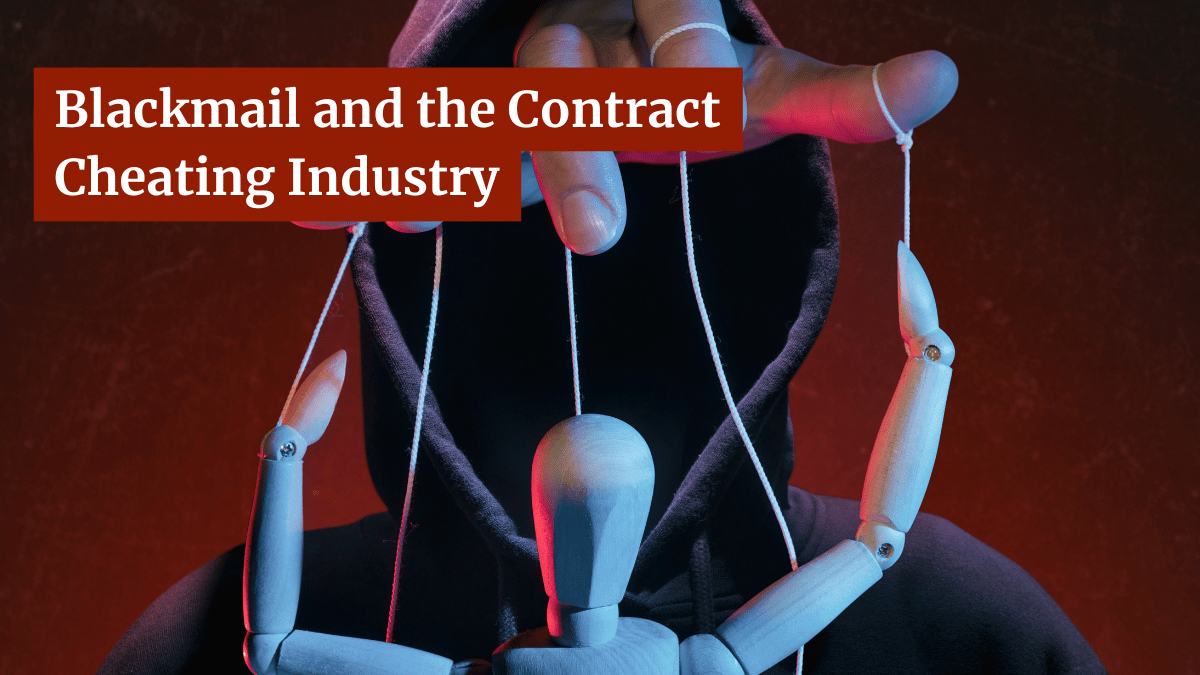Blackmail and the Contract Cheating Industry

A recent article by Kathryn Palmer at Inside Higher Ed highlights one of the less-discussed dangers of students cheating: Blackmail.
The article tells the story of Katie Ragsdale, a staff member at Polk State College in Florida. She had become curious about whether it was possible for paid cheating services to bypass the various countermeasures the school had implemented.
So, she opted to try an experiment. Using an account she still had from her time as a student, she hired a Pakistan-based company to take a multiple-choice algebra exam. Using a VPN to access her computer, the other person took control of her machine, answering questions for her while she completed the steps needed to prove that she was the one in front of the screen.
The end results were mixed. She was able to successfully cheat the exam, receiving an A, but not without tripping warnings or having to find workarounds for network blocks. In the end, proctors admitted that, despite the warnings, there was not enough evidence to prove that she had cheated on the test.
However, after the test was completed, there was a brief snag with payment. That delay prompted a very strong reaction from the professional cheater, who immediately took to blackmailing Ragsdale, not realizing she was not a regular student.
This campaign included emails, posts on social media, and other messages. Among the threats were to “burn her career” as well as evidence recorded by the cheater showing that they were the one who took the exam while Ragsdale watched.
The story is a stark reminder that the world of professional cheating is a dangerous one. The risks go well beyond simply being caught cheating and can involve consequences both inside and outside the classroom.
A Dangerous Game
Contract cheating is an umbrella term that covers a wide variety of business including essay mills, test taking services and services that sell test answers. However, what they all share is that they are businesses that students pay to help the cheat on school assessments.
The industry has been on the rise for some time and was the focus of many academic integrity conversations going back to 2019 and beyond. However, the pandemic caused an explosion in the industry as schools all over the world had to make a quick pivot to online learning.
That said, the industry has always been exploitative. From deceptive/spam marketing to abusive labor practices and beyond, the industry has long used its shadowy nature to hide other unethical or even illegal practices.
When students use such a service, it is likely that their biggest concern is getting caught cheating. However, as we have seen repeatedly, hiring a contract cheating service opens them up to being the victim of various other crimes.
As Ragsdale’s story points out, the industry is rife with blackmail. Essay mills have been particularly well known for this practice and have drawn headlines for it going back at least six years. Though, in Ragsdale story, the blackmail only came about due to a payment hiccup, there have been plenty of cases of contract cheaters blackmailing students who did pay to squeeze extra cash out of them.
However, blackmail is not the only danger. Many of the services turn out to be frauds. They either fail to deliver the service or, if they do, it is low quality and hurts the student’s grade rather than helping it.
Even using a service that you or others have found reliable is no guarantee that your interaction with it will be positive. Such companies typically rotate through contractors rapidly. You simply cannot be certain what service you are going to get and, if you are not happy, there is no recourse to get your money back.
Also, since contract cheating services are barred from most legitimate payment processors, they must use alternative means to receive payment. This opens students to credit card/identity theft and other financial crimes.
While most students who use contract cheating services will not experience these issues, that does not change the fact that contract cheating is needlessly risky, and those risks go beyond just their academic career.
A Change in Message
One of the takeaways that the school got from Ragsdale’s experiment was that there needs to be a change in pedagogy when it comes to talking about contract cheating.
Most schools, when talking about contract cheating, focus heavily on the safeguards that are in place to prevent it and the consequences of being caught cheating. While these are important talking points, they clearly are not the only (and perhaps not even the greatest) threat that students face.
Stories like this one are reminders that, when students purchase contract cheating services, they are participating in an illicit market. Doing so carries the same dangers and risks of participating in any illicit market, simply because there are no practical legal protections for students once they enter it.
Simply put, deterring students from cheating requires a multi-pronged approach. That includes technological protections, crafting cheat-resistant assignments, encouraging ethics and warning students of the dangers of cheating.
On the latter point, it is important to warn them of ALL the dangers, not just the academic students. Students are unlikely to cheat if they think there is a considerable risk they will be caught, so threats of expulsion or failing a class are not likely to move the needle much.
However, threats of blackmail and identity theft may give students pause before handing over their credit card information.
Bottom Line
In the end, this is a great reminder of the true dangers of contract cheating. The contract cheating industry is exploitative in every respect of the word and students need to be aware of that.
To be clear, some students will always be tempted to cheat. As Sara Rieder Bennett, the president of the National College Testing Association, noted in the article, “People cheat on everything.” This is not a problem unique to academia.
However, the contract cheating industry does present an incredibly unique and very real threat to the educational system. Getting honest assessments of students’ abilities is crucial to ensuring the validity of degrees and diplomas awarded. The contract cheating industry represents a targeted, well-financed and highly unethical threat to that validity.
But, while we may not be able to stamp out the industry or deter all students from cheating, we can make them aware of the true risks and, hopefully, turn at least some students away from it.
This is a space where an ounce of prevention truly is worth a pound of cure. And stories like this can be highly effective prevention for many students.
Want to Reuse or Republish this Content?
If you want to feature this article in your site, classroom or elsewhere, just let us know! We usually grant permission within 24 hours.
